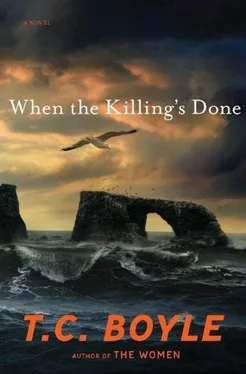There was a crowd gathered at the far end of the pier and they’d gone toward it casually, out of idle curiosity, people looping this way and that, little kids squirming through to the front for a closer view, and there it was, more novelty, the first shark she’d ever seen outside of a picture book. It was suspended by its tail on a thick braid of cable that held it, dripping, just above the bleached boards of the dock. The fisherman — a Negro, and that was a novelty too, a Negro fisherman on the Santa Monica pier— stood just off to the left of it while his companion, another Negro, took his photograph with a Brownie camera. “Hold steady now,” the second man said. “Less have a smile. C’mon, give us a grin.”
A woman beside her made a noise in her throat, an admixture of disgust and fascination. “What is it?” the woman said. “A swordfish?”
The first man, the fisherman, smiled wide and the camera clicked. “You see a sword?” he asked rhetorically. “I don’t see no sword.”
“It’s a dolphin,” somebody said.
“Ain’t no dolphin,” the fisherman retorted, enjoying himself immensely. “Ain’t no tunafish neither.” He bent close to the thing, to the half-moon of the gill slit and the staring eye, and then cupped a hand over the unresisting snout and tugged upward. “See them teeth?”
And there they were, suddenly revealed, a whole landscape of stacked and serrated teeth running off into the terra incognita of the dark gullet, and it came to her that this was a shark, the scourge of the sea, the one thing that preyed on all the rest, that rose up in a blanket of foam to ravage a seal or maim a surfer and ignite an inflammatory headline out of La Jolla or Redondo Beach that everybody forgot about a week later.
“What this is, what you looking at right now? This a great white shark, seven feet six inches long. As bad as it gets. And this one’s not much more than a baby. Hell, they five feet long when they come out their mother.”
The crowd pressed in. Till’s eyes were gleaming, and this was a thing he could appreciate, a man’s thing, as bad as it gets . There was only one question left to ask and she heard her own voice quaver as she asked it: “Where did you catch it?”
A pause. A smile. Another click of the camera. “Why, right here, right off the end of the dock.”
The image had stayed with her a long while. She’d asked Till about it, about how that could be, what the man had said — right off the dock, right there where she’d been swimming since she was a little girl — and he’d tried to reassure her. “They can turn up anywhere, I suppose,” he said, “but it’s rare here. Really rare.” He gave her a squeeze, pulled her to him. “Where you really find them,” and he pointed now, out into the band of mist that fell across the horizon, “is out there. Off the islands.”
People died of shark bite. They died of thirst. Of hypothermia. She was dressed in nothing but bra and panties, naked to the water and the water sucking the heat from her minute by minute, and she clung there and shivered and felt the volition go out of her. Let the sharks come, she was thinking, dreaming, the cold lulling her now till she was like the man in that other Jack London story, the one who laid himself down and died because he couldn’t build a fire. Well, she couldn’t build a fire either because water wouldn’t burn and there was nothing in this world that wasn’t water.
She woke sputtering, choked awake, a cold fist in her throat. She was coughing — hacking, heaving, retching — and the violence of it brought her back again. Sun, sea, wind, waves. Sun. Sea. Wind. Waves. The ice chest bobbed and she bobbed with it. And then, all at once, there was something else there with her, something new, a living thing that broke the surface in a fierce boiling suddenness that annihilated her, the shark, the shark come finally to draw the shroud. She shut her eyes, averted her face. She didn’t draw up her legs because there was no point in it now, the drop was coming, the first rending shock of the jaws, sadness spreading though her like a stain in water, sadness for Till, for her parents, for what might have been. . but the next moment slipped by and the moment after that and still she was there and still she was whole, bobbing along with the ice chest, bobbing.
The next splash was closer. She forced open her eyes, tried to focus through the drooping curtains of her swollen lids. Her pupils burned. The blood pounded in her ears. It took her a moment to understand that this wasn’t a shark, wasn’t a fish at all — fish didn’t have dog faces and whiskers and eyes as round and darkly glowing as a human’s. She stared into those eyes, amazed, until they sank away in the wash and she looked beyond the swirl of foam to the sun-scoured wall of rock rising out of the mist above her.
Anacapa is the smallest of the four islands that form the archipelago of the northern Channel Islands and the closest to the mainland, a mere eleven miles from its eastern tip to the harbor at Oxnard. It parallels the coast in its east-west orientation, from Arch Rock in the east to Rat Rock on the western verge, and is, geologically speaking, a seaward extension of the Santa Monica Mountains. In actuality, Anacapa comprises three separate islets, connected only during extreme low tides, and it is of volcanic origin, composed primarily of basalt dating from the Miocene period. All three islets are largely inaccessible from the sea, featuring tall looming circumvallate cliffs and strips of cliff-side beach that darkly glisten with the detritus ground out of the rock by the action of the waves. As seen from the air, the islets form a narrow snaking band like the spine of a sea serpent, the ridges articulated like vertebrae, claws fully extended, jaws agape, tail thrashing out against the grip of the current. Seabirds nest atop the cliffs here and on the tableland beyond — Xantus’s murrelet, the brown pelican and Brandt’s cormorant among them — and pinnipeds racket along the shore. Average rainfall is less than twelve inches annually. There is no permanent source of water.
Beverly knew none of this. She didn’t know that the landfall looming over her was Anacapa or that she’d drifted some six miles by this point. She knew only that rock was solid and water was not and she made for it with all the strength left in her. Twice she went under and came up gasping and it was all she could do to keep hold of the ice chest in the roiling surf that had begun to crash round her. All at once she was in the breakers and the chest was torn from her, gone suddenly, and she had no choice but to squeeze her eyes shut and extend her arms and ride the wave till the force of it flung her like so much wrack at the base of the cliff. Stones rolled and collided beneath her knees and the frantic grabbing of her hands, she was tossed sideways and had the breath pounded out of her, but her fingers snatched at something else there, sand, the floor of a beach gouged out of the rock. It was nothing more than a semicircular pit, churning like a washing machine, but it was palpable and it held her and when the wave sucked back she was standing on solid ground. She might have felt a surge of relief, but she didn’t have a chance. Because she was shivering. Dripping. Staggering. And the next wave was already coming at her.
The foam shot in, sudsing at her knees, driving her back awkwardly against the punishing black wall of the overhang. She found herself stumbling to her left, even as the next breaker thundered in, and then she was crawling on hands and knees up and away from it, the rock pitted and sharp and yet slick all the same, up and out of the water and onto a narrow perch that was no wider than her berth on the Beverly B. She hugged her knees to her chest, clamped her hands round her shoulders, shaking with cold. Her hair hung limp in her face. The waves crashed and dissolved in mist and everything smelled of funk and rot and the protoplasmic surfeit of all those galaxies of wheeling, biting, wanting things that hadn’t survived the day. She didn’t think about Till or the boat or Warren, her mind drawn down to nothing. She just stared numbly at the wash as it stripped the beach and gave it back again, torn strands of kelp struggling to and fro, a float of driftwood, the suck and roar, and then she was asleep.
Читать дальше












